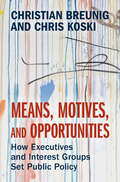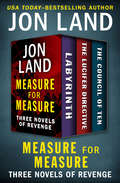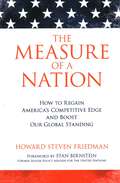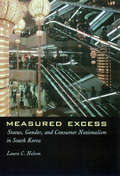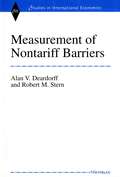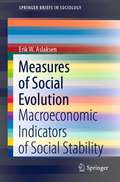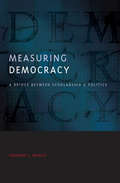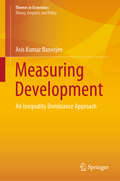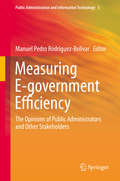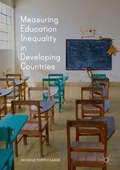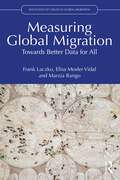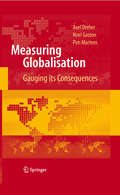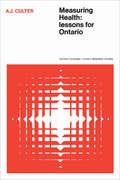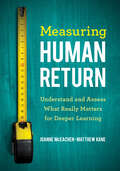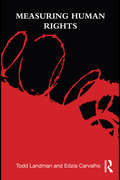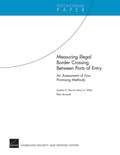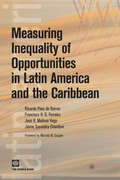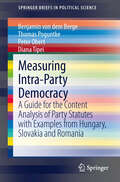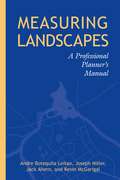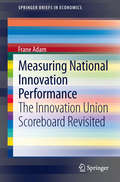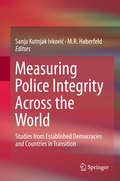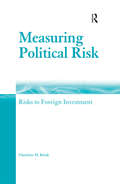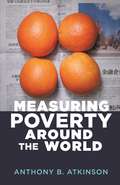- Table View
- List View
Means, Motives, and Opportunities: How Executives and Interest Groups Set Public Policy
by Christian Breunig Chris KoskiMeans, Motives, and Opportunities illuminates how states spend public money through the lens of governmental structure, executive power, and interest group competition. Christian Breunig and Chris Koski argue that policymaking is a function of not only policymakers' means (powers), but of their motives (issues) and opportunities (interest group competition) for change. Using over twenty-five years of data across all fifty US states, four in-depth case studies, and multiple examples of budget battles, the book describes a budget-making environment in which governors must balance the preferences of interest groups with their own, all while attempting to build a budget that roughly balances. While governors are uniquely powerful, the range of changes they can make is largely impacted by interest group competition. By showing how means, motives, and opportunities matter, the book shows how spending decisions at the state level influence nearly every aspect of American life.
Measure for Measure: Three Novels of Revenge
by Jon LandVengeance leads to justice in this trio of thrillers from the USA Today–bestselling author and “one of the best all-out action writers in the business” (Los Angeles Review of Books). “Nobody writes action like Jon Land,” and in these three action-packed thrillers, personal quests for vengeance expose international conspiracies posing global threats (John Lescroart). No wonder James Rollins says: “Jon Land proves yet again that suspense has a new king.” Labyrinth: An American op in Colombia has discovered a far-reaching conspiracy, code-named Tantalus. After he is murdered, the State Department enlists an old friend of his. Once the Academy’s brightest prospect, Christopher Locke is now an unemployed professor sunken in debt, struggling to support three children. To avenge his friend’s death, Locke pursues a nefarious organization known as the Committee from Lichtenstein to Geneva to London, but with every turn he finds himself closer and closer to his own dead end. The Lucifer Directive: Since the day his father was murdered by hijackers, Dan Lennigin has dreamed about taking revenge on the world’s terrorists. Now a college student, he is awakened one night by a phone call and hears a code meant for someone else’s ears. Minutes after the call, an operative for the antiterrorist agency Lucifer is killed, and his superiors come for Dan. He is the only one who has heard the warning, and the only one who can stop an international terrorist conspiracy. The Council of Ten: After his cocaine-smuggling grandmother turns informant for the DEA and is murdered by a vicious drug lord, journalist Drew Jordan vows to avenge her. But he soon discovers the drug-smuggling operation is only the tip of a global conspiracy. Teaming up with an ex-CIA black ops agent known as the Timber Wolf and a lethal female Mossad agent, Jordan must bring down a shadow organization known only as the Council of Ten.
Measure of a Nation: How to Regain America's Competitive Edge and Boost Our Global Standing
by Howard Steven FriedmanIf America were a corporation, how would an independent analyst judge its ability to compete against other corporate giants? According to the author, that hypothetical analyst would label America a corporate dinosaur and recommend that the nation either change or face extinction. This book focuses on how to improve America by first comparing its performance with thirteen competitive industrial nations, then identifying the best practices found throughout the world that can be adopted here in the United States. The author lays out some disturbing facts about America's lack of competitiveness in five key areas: health, education, safety, equality, and even democracy. Taking the approach that "data doesn't lie," the author notes alarming statistics, for example: -Americans have the lowest life expectancy among all competitor nations. -Americans are at least two times more likely to be murdered and four times more likely to be incarcerated than any other competitor country, including Japan, France, and the United Kingdom. -America shows the sharpest disparity between rich and poor among all nations on its competitor list. Using charts that clearly illustrate the unbiased, party-neutral data, the author uncovers the major problem areas that the nation must address to become a leader again. Homing in on best practices from other countries than can be adapted to the United States, the author plots a course to transform America from a corporate behemoth burdened by internal issues and poor performance to a thriving business with an exciting portfolio of solutions.
Measured Excess: Status, Gender, and Consumer Nationalism in South Korea
by Laura C. NelsonMeasured Excess: Status, Gender, and Consumer Nationalism in South Korea.
Measurement of Fiscal Impact: Methodological Issues
by Mario I. Blejer Ke-Young ChuA report from the International Monetary Fund.
Measurement of Nontariff Barriers
by Robert M. Stern Alan V. DeardorffAs tariffs on imports of manufactures have been reduced as a result of multi-lateral trade negotiations, interest in the extent to which existing nontariff barriers may distort and restrict international trade is growing. Accurate and reliable measures are needed in order to address the issues involving the use and impacts of nontariff barriers. This study assesses currently available methods for quantifying such barriers and makes recommendations as to those methods that can be most effectively employed. The authors focus both on the conceptual issues arising in the measurement of the different types of nontariff barriers and on the applied research that has been carried out in studies prepared by country members of the OECD Pilot Group and others seeking to quantify the barriers. Nontariff barriers include quotas, variable levies, voluntary export restraints, government procurement regulations, domestic subsidies, and antidumping and countervailing duty measures. The authors discuss the many different methods available for measuring the effects of these and other nontariff barriers. Illustrative results are presented for industrial OECD countries, including Australia, Canada, Germany, Norway, the European Union, the United Kingdom, and the United States. Finally, the authors offer guideline principles and recommend procedures for measuring different types of nontariff barriers.
Measures of Social Evolution: Macroeconomic Indicators of Social Stability (SpringerBriefs in Sociology)
by Erik W. AslaksenThis book extends a previously published model of social evolution by using macroeconomic measures to indicate both the current state of the society, and its evolutionary trajectory. This model considers society as a system of interacting elements evolving through stages of increasing strength of interaction and complexity of structure. It measures society in constituting the world collectively, with nation-states as the elements, here described through macroeconomic measures such as GDP, government expenditure, and inequality. The economic data presented indicates that this stage is approaching the next evolutionary step, which is either the formation of a world society of nations, with an associated overarching common infrastructure absorbing some of the sovereign functions of nation-states as they exist today, or as a society of competing groups of nations, each bound by alliances and bilateral agreements. The book explores how the former faces great obstacles in the form of nationalism and a misunderstood concept of sovereignty, and poses that it is in an embryonic stage. The author poses that it is this structure that would be best equipped to handle common challenges, such as the environment and global warming, and topically, pandemics. A novel interdisciplinary text in social complexity, this book is of interest to researchers in socio-economic fields.
Measuring Democracy: A Bridge between Scholarship and Politics (Democratic Transition and Consolidation)
by Gerardo L. MunckAlthough democracy is a widely held value, concrete measurement of it is elusive. Gerardo L. Munck’s constructive assessment of the methods used to measure democracies promises to bring order to the debate in academia and in practice.Drawing on his years of academic research on democracy and measurement and his practical experience evaluating democratic practices for the United Nations and the Organization of American States, Munck's discussion bridges the theories of academia with practical applications. In proposing a more open and collaborative relationship between theory and action, he makes the case for reassessing how democracy is measured and encourages fundamental changes in methodology. Munck’s field-tested framework for quantifying and qualifying democracy is built around two instruments he developed: the UN Development Programme’s Electoral Democracy Index and a case-by-case election monitoring tool used by the OAS.Measuring Democracy offers specific, real-world lessons that scholars and practitioners can use to improve the quality and utility of data about democracy.
Measuring Development: An Inequality Dominance Approach (Themes in Economics)
by Asis Kumar BanerjeeThis book discusses how to measure the level of development of an economy, particularly, the task of ranking economies in terms of their development. In this context, development is defined as an increase in people’s level of wellbeing. The book emphasises that wellbeing is a multidimensional concept, and that it is important to ask how equitably the fruits of development are distributed, and as such it focuses on multidimensional, inequality-sensitive development ranking. Rather than using various specific development indices, which would lead to different development rankings for a country, the book proposes a dominance approach, which formulates conditions under which two economies can be ranked unambiguously, making it valid for all reasonable development indices. With the help of illustrative examples using real-world data, it demonstrates that such unambiguous rankings are possible, and that the proposed approach can be used to complement traditional approaches. An invaluable resource for researchers working in the field of development, the book will also appeal to practitioners engaged in measuring development.An excerpt from the book's Foreword:"[This book] is a comprehensive and valuable contribution to the literature on the measurement of inequality and the use of such measurement in the assessment of social welfare. I believe that it will be of much interest to researchers working on measures of inequality and social welfare as well as advanced graduate students who are looking for a solid introduction to this important area of normative economics."- Prof. Prasanta K. Pattanaik, University of California, Riverside, California, U.S.A.
Measuring E-government Efficiency
by Manuel Pedro Rodríguez-BolívarE-government has the potential to improve public services, information transparency, and the engagement of civic participation of the public sector management. This book analyzes the achievement of expectations created by public managers, policy-makers, and stakeholders with regard to the implementation of e-government policies and applications. It also tries to determine whether e-government applications have been introduced as a fad or according to real demands from citizenry and if efforts within e-government have been effective. This book investigates how public managers and policy-makers imagine e-government policies and the impact of those policies on their management and decision-making process through the engagement of citizenry. It is also discusses whether e-government policies are merely procedural improvements that strictly introduce new ways of delivering public services or disclosing public sector information. The book's analysis of the overall expectations on e-government applications makes it of interest to scholars in public administration as well as to policy-makers and stakeholders.
Measuring Education Inequality in Developing Countries
by Nichole Torpey-SaboeThis book constructs a measure of education inequality using time-series cross-national data and utilizes real-world examples based on author interviews. It provides insights into how classic trade theory might be applied more broadly to generate expectations not only about income distribution, but also about investment in human capital. The project explores the ways in which global trends toward urbanization and democratization might be expected to impact education inequality. The author addresses contemporary issues in politics, such as growing income inequality, the backlash against globalization and free trade, and concerns that democratic institutions are elite-dominated and unresponsive to the needs of common citizens.
Measuring Global Migration: Towards Better Data for All (Routledge Key Issues in Global Migration)
by Frank Laczko Elisa Mosler Vidal Marzia RangoThis book focuses on how to improve the collection, analysis and responsible use of data on global migration and international mobility.While migration remains a topic of great policy interest for governments around the world, there is a serious lack of reliable, timely, disaggregated and comparable data on it, and often insufficient safeguards to protect migrants’ information. Meanwhile, vast amounts of data about the movement of people are being generated in real time due to new technologies, but these have not yet been fully captured and utilized by migration policymakers, who often do not have enough data to inform their policies and programmes. The lack of migration data has been internationally recognized; the Global Compact for Safe, Orderly and Regular Migration urges all countries to improve data on migration to ensure that policies and programmes are "evidence-based", but does not spell out how this could be done. This book examines both the technical data issues associated with improving data on migration and the wider political challenges of how countries manage the collection and use of migration data. The first part of the book discusses how much we really know about international migration based on existing data, and key concepts and approaches which are often used to measure migration. The second part of the book examines what measures could be taken to improve migration data, highlighting examples of good practice from around the world in recent years, across a range of different policy areas, such as health, climate change and sustainable development more broadly. Written by leading experts on international migration data, this book is the perfect guide for students, policymakers and practitioners looking to understand more about the existing evidence base on migration and what can be done to improve it.
Measuring Globalisation
by Pim Martens Axel Dreher Noel GastonGlobalisation is a timely and controversial topic. Against the chorus of globalisation's proponents and detractors, the authors propose an approach for measuring globalisation and its consequences. Undertaking a comprehensive review of the literature on globalisation and using data from the MGI and KOF indices, the well-respected authors build a framework for defining globalisation and analyzing the relationships among economic, political, and social variables.
Measuring Health: Lessons for Ontario
by Anthony CulyerPlanning and evaluating any health care program is a formidable task: how do you measure the health of a population? This fundamental question has been approached from various perspectives in medical, administrative, and economic studies. This book provides a guide to health measurement literature and relates it to Ontario's current and prospective policy choices and to the federal context of health indicators and indices to existing statistics in Ontario in a county-by-county survey of the province's health care. He also outlines the kinds of information essential to health assessment but not currently available. The book as a whole emphasizes the importance of health care measurement in the humane and efficient planning of health services. It will be of interest to all concerned with the practice of medicine in the 1980s and the planning of health services at the federal and provincial levels, as well as to those with a special interest in health from the economic, political, and sociological perspectives.
Measuring Human Return: Understand and Assess What Really Matters for Deeper Learning
by Matthew Kane Joanne J. McEachenMeasure what matters for deeper learning Getting at the heart of what matters for students is key to deeper learning that connects with their lives, but what good is knowing what matters without also understanding how to bring it to life? What does it really take to know who students are, what they are truly learning, and why? Measuring Human Return solves this dilemma with a comprehensive, systematic process for measuring deeper learning outcomes. Educators will learn to assess students’ self-understanding, knowledge, competencies, and connections through vignettes, case studies, learning experiences and tools. The book helps readers: Develop key system capabilities to build the foundation for sustainable engagement, measurement, and change Discover five comprehensive "frames" for measuring deeper learning Engage in the process of collaborative inquiry Commit to the central, active role of learners by engaging them as partners in every aspect of their learning Discover how to take an authentic, formative, and inquiry-driven approach to measuring the outcomes that drive deeper learning. The book really hits the mark. The best thing about it is the in-depth discussion of systems. It is with great pleasure that I read and re-read this book. It delivers a good combination of big vision with specific strategies and techniques. Jeff Beaudry, Professor, Educational Leadership; University of Southern Maine; Portland, ME This is just what we need in our district. This engaging book will help Change Teams support their systems to effectively measure deeper learning. Readers will be drawn in by great examples from around the globe of educators putting students first. This energizing book calls us to take action for all of our students today and for our future. Charisse Berner, Director of Teaching and Learning, Curriculum; Bellingham Public Schools; Bellingham, WA
Measuring Human Return: Understand and Assess What Really Matters for Deeper Learning
by Matthew Kane Joanne J. McEachenMeasure what matters for deeper learning Getting at the heart of what matters for students is key to deeper learning that connects with their lives, but what good is knowing what matters without also understanding how to bring it to life? What does it really take to know who students are, what they are truly learning, and why? Measuring Human Return solves this dilemma with a comprehensive, systematic process for measuring deeper learning outcomes. Educators will learn to assess students’ self-understanding, knowledge, competencies, and connections through vignettes, case studies, learning experiences and tools. The book helps readers: Develop key system capabilities to build the foundation for sustainable engagement, measurement, and change Discover five comprehensive "frames" for measuring deeper learning Engage in the process of collaborative inquiry Commit to the central, active role of learners by engaging them as partners in every aspect of their learning Discover how to take an authentic, formative, and inquiry-driven approach to measuring the outcomes that drive deeper learning. The book really hits the mark. The best thing about it is the in-depth discussion of systems. It is with great pleasure that I read and re-read this book. It delivers a good combination of big vision with specific strategies and techniques. Jeff Beaudry, Professor, Educational Leadership; University of Southern Maine; Portland, ME This is just what we need in our district. This engaging book will help Change Teams support their systems to effectively measure deeper learning. Readers will be drawn in by great examples from around the globe of educators putting students first. This energizing book calls us to take action for all of our students today and for our future. Charisse Berner, Director of Teaching and Learning, Curriculum; Bellingham Public Schools; Bellingham, WA
Measuring Human Rights
by Todd Landman Edzia CarvalhoThe measurement of human rights has long been debated within the various academic disciplines that focus on human rights, as well as within the larger international community of practitioners working in the field of human rights. Written by leading experts in the field, this is the most up-to-date and comprehensive book on how to measure human rights. Measuring Human Rights: draws explicitly on the international law of human rights to derive the content of human rights that ought to be measured contains a comprehensive methodological framework for operationalizing this human rights content into human rights measures includes separate chapters on the methods, strengths and biases of different human rights measures, including events-based, standards-based, survey-based, and socio-economic and administrative statistics covers measures of civil, political, economic, social and cultural rights includes a complete bibliography, as well as sources and locations for data sets useful for the measurement of human rights. This volume offers a significant and timely addition to this important area of work in the field of human rights, and will be of interest to academics and NGOs, INGOs, international governmental organizations, international financial institutions, and national governments themselves.
Measuring Illegal Border Crossing Between Ports of Entry
by Henry H. Willis Peter Brownell Andrew R. MorralThe U.S. Department of Homeland Security is responsible for controlling the flow of goods and people across the U.S. border, but compelling methods for producing estimates of the total flow of illicit goods or border crossings do not yet exist. This paper describes four innovative approaches to estimating the total flow of illicit border crossings between ports of entry. Each approach is sufficiently promising to warrant further attention.
Measuring Inequality of Opportunities in Latin America and the Caribbean
by Ricardo Paes de Barros Francisco H. G. Ferreira Jaime Saavedra Chanduvi Jose R. Molinas VegaEquality of opportunity is about leveling the playing field so that circumstances such as gender, ethnicity, place of birth, or family background do not influence a person's life chances. Success in life should depend on people's choices, effort and talents, not to their circumstances at birth. 'Measuring Inequality of Opportunities in Latin America and the Caribbean' introduces new methods for measuring inequality of opportunities and makes an assessment of its evolution in Latin America over a decade. An innovative Human Opportunity Index and other parametric and non-parametric techniques are presented for quantifying inequality based on circumstances exogenous to individual efforts. These methods are applied to gauge inequality of opportunities in access to basic services for children, learning achievement for youth, and income and consumption for adults.
Measuring Intra-Party Democracy
by Thomas Poguntke Benjamin von dem Berge Peter Obert Diana TipeiThis book presents an integrated approach to measuring the level of intra-party democracy through deductive and standardized content analysis of party statutes. Following the two main criteria of intra-party democracy - inclusiveness and decentralization - three main categories of intra-party democracy are theoretically derived: members' rights, organizational structure and decision-making. On the basis of theoretical considerations further sub-categories and individual items are deduced from these main categories and put together into a comprehensive coding scheme. Furthermore, precise coding instructions are presented. Since it is the ultimate aim of this book to present an approach to measuring the level of intra-party democracy for any party statute and to express this in numerical terms, the final step is the quantification of the coded data and the calculation of a numeric measure of intra-party democracy. A numeric value of intra-party democracy can be calculated for any statute of any political party. Furthermore, empirical examples from Hungary, Slovakia and Romania are presented.
Measuring Landscapes: A Planner's Handbook
by Jack Ahern Joseph Miller Kevin Mcgarigal Andre Botequilha LeitaoThis practical handbook bridges the gap between those scientists who study landscapes and the planners and conservationists who must then decide how best to preserve and build environmentally-sound habitats. Until now, only a small portion of the relevant science has influenced the decision-making arenas where the future of our landscapes is debated and decided. The authors explain specific tools and concepts to measure a landscape's structure, form, and change over time. Metrics studied include patch richness, class area proportion, patch number and density, mean patch size, shape, radius of gyration, contagion, edge contrast, nearest neighbor distance, and proximity. These measures will help planners and conservationists make better land use decisions for the future.
Measuring National Innovation Performance
by Frane AdamThis book provides a critical re-examination of the Innovation Union Scoreboard (IUS) as the main tool used by the European Commission and other policy-making bodies to measure national innovation capacity. Given that contemporary societies and economies are to a great extent characterised by the processes of production, dissemination and application (re-combination) of knowledge, the accurate monitoring and measurement of R&D efficiency and innovation performance on national, regional and firm level are of outmost importance. The contextual reconstruction of the model of indicators used by IUS reveals that the accuracy and validity of measurement are not satisfactory, and that substantial modifications of metrics are needed to achieve stronger theoretical significance and policy-relevance. In this work, the »epistemic turn« is emphasised and offered as an alternative, namely in the sense of the shift from a mechanicist-positivist orientation toward a more reflective and contextual post-positivist approach.
Measuring Police Integrity Across the World
by M. R. Haberfeld Sanja Kutnjak IvkovićThis book brings together research on police integrity on regions worldwide. The results for each country indicate whether police officers know the official rules, how seriously they view police misconduct, what they think the appropriate and expected discipline for misconduct should be, and how willing they are to report it. Police misconduct refers to everything from corruption and use excessive force, to perjury, falsification of evidence, and failure to react. Police Integrity and police misconduct are topics of great concern worldwide. Police integrity is envisioned as the inclination to resist temptations to abuse the rights and privileges of police occupation. Using their extensive experience studying police integrity in the United States, the editors have created an applicable framework for measuring police integrity in other countries. The results of their research are brought together in this timely volume, including contributions from both established democracies and countries in transition, which each present unique challenges for improving police integrity. Each chapter follows the same format and contains a theoretical analysis of the relevant legal, historical, political, social, and economic conditions in the country, followed by the analyses of empirical results and policy recommendations. In the last chapter, editors Kutnjak Ivković and Haberfeld take a comparative look across the countries by engaging in the in-depth comparative analysis. This work will be of interest to researchers and policy-makers studying policing both in the United States and internationally, presenting a theoretical framework that can be applied to other regions for further research.
Measuring Political Risk: Risks to Foreign Investment
by Charlotte H. BrinkOffering a fresh, transparent approach encompassing new material, this invigorating volume measures political risk - for instance the risk that foreign investment might face in any country. It also demonstrates how progress or regress made in good governance initiatives as conditionalities to aid can be assessed. Governments can monitor their own policy environment(s), and take remedial action if necessary. The methodology allows for measurement of previously un-quantified 'soft' factors that add to the risks foreign investors might face, demonstrating why these factors are of importance to both risk assertive and risk averse investors. Features include: - 103 contextualized, measurable risk factors and their 411 risk factor indicators. - Guidelines to using these factors in order to perform generic macro analyses, or micro, client/project/industry-specific analyses. - Explanation of the methodology with which to comprehensively measure the probability of risk occurring in any macro or micro investment climate.
Measuring Poverty around the World
by Anthony B. AtkinsonThe final book from a towering pioneer in the study of poverty and inequality—a critically important examination of poverty around the worldIn this, his final book, economist Anthony Atkinson, one of the world’s great social scientists and a pioneer in the study of poverty and inequality, offers an inspiring analysis of a central question: What is poverty and how much of it is there around the globe? The persistence of poverty—in rich and poor countries alike—is one of the most serious problems facing humanity. Better measurement of poverty is essential for raising awareness, motivating action, designing good policy, gauging progress, and holding political leaders accountable for meeting targets. To help make this possible, Atkinson provides a critically important examination of how poverty is—and should be—measured.Bringing together evidence about the nature and extent of poverty across the world and including case studies of sixty countries, Atkinson addresses both financial poverty and other indicators of deprivation. He starts from first principles about the meaning of poverty, translates these into concrete measures, and analyzes the data to which the measures can be applied. Crucially, he integrates international organizations’ measurements of poverty with countries’ own national analyses.Atkinson died before he was able to complete the book, but at his request it was edited for publication by two of his colleagues, John Micklewright and Andrea Brandolini. In addition, François Bourguignon and Nicholas Stern provide afterwords that address key issues from the unfinished chapters: how poverty relates to growth, inequality, and climate change.The result is an essential contribution to efforts to alleviate poverty around the world.
